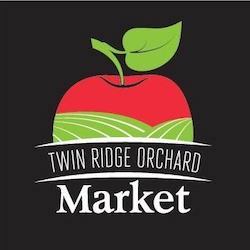
Twin Ridge Orchard
- Farmers Markets
- Member of WV Grown Program
- Apples, Peaches, Cherries, Blueberries
1583 Ridge Rd.
Shenandoah Junction, VA 25442
Twin Ridge Orchards is a Farmers Market with fresh-picked and locally grown fruits and vegetables. Their orchard is in Shenandoah Junction, West Virginia, and is closed to the public. Their products can be found at the Charles Town Farmers Market on select Saturdays and at the Shepherdstown Farmers Market on select Sundays.
An Interview with Mary Kathryn Robinson, Co-Owner of Twin Ridge Orchard
Q: What’s the origin story of Twin Ridge Orchard?
“A family-owned operation, our Great Grandmother (Higgs) Hockensmith family had orchards on Higgs Mountain, VA. Local origin is our Great Grandfather Samuel Hockensmith from Jefferson County, WV purchased Shady Hill Orchard and Hillside Fruit Farm near Harpers Ferry, WV. His son, Robert A. Hockensmith (Grandfather) and Burr (of Burr Industrial Park) partnered to purchase an existing orchard owned by the Snyder Family outside Shenandoah Junction, WV. In 1922 R.A. Hockensmith purchased 44 acres known as Sandy Ridge from the B&O Railroad. And, in 1939 expanded operations when he purchased ‘York Hill’, another existing orchard from the Snyder’s adding @ 130 additional acres. The oldest apple trees on York Hill were planted in 1893, a block of Red Delicious.
In the early 1980s, R.A. Hockensmith sold Shady Hill Orchard to the National Park Service, land of historical value as Thomas ‘Stonewall’ Jackson initiated his assault on Boliver Heights. At its height, 400 acres was an active orchard production. Today R.A. Hockensmith’s grandchildren, under Gordon Hockman’s oversight, have @ 120 acres in active production. ‘York Hill’ and Twin Ridge Orchard are now under Jefferson County Farmland Protection and can never be developed. The York Hill Barn is currently an event site, and Twin Ridge Upland Bird Farm is a licensed shooting preserve operating November – March.”
Life on the farm
Q: What sprays, pesticides or herbicides do you use?
“Operating an orchard is much more complicated than most people realize. As a commercial grower, we do use spray material to control invasive bugs, bore, tree blight and fungus that are common to the Mid-Atlantic region. To minimize its use, we follow integrated pest management practices to monitor and address issues as they arise.”
Q: What is your favorite part of running the orchard?
“The public’s reaction when they taste our high-quality fruit.”
Q: Share a favorite experience connected to the orchard?
“In the late 1960s Twin Ridge had extensive acreage in cherry production. Summer harvest was a community event as @ 200 locals of all ages came out to pick cherries. As young children, we were expected to work along with everyone else. I remember vividly preparing cash envelopes with the week’s earnings and delivering them around the community with my father.”
Q: How do you feel about using locally sourced goods?
“A proponent to buy fresh, buy local. Supporting farmers is paramount to our survival.”
Q: What do you do in the off-season?
“Contrary to popular belief there is no ‘off-season’ as the winter months are spent pruning the trees, repairing boxes and equipment in preparation for the Spring bloom. Until the last threat of freezing temperatures in mid-May, there is also a lot of praying that Mother Nature will cooperate.”



Life on the farm
Q: What sprays, pesticides or herbicides do you use?
“Operating an orchard is much more complicated than most people realize. As a commercial grower, we do use spray material to control invasive bugs, bore, tree blight and fungus that are common to the Mid-Atlantic region. To minimize its use, we follow integrated pest management practices to monitor and address issues as they arise.”
Q: What is your favorite part of running the orchard?
“The public’s reaction when they taste our high-quality fruit.”
Q: Share a favorite experience connected to the orchard?
“In the late 1960s Twin Ridge had extensive acreage in cherry production. Summer harvest was a community event as @ 200 locals of all ages came out to pick cherries. As young children, we were expected to work along with everyone else. I remember vividly preparing cash envelopes with the week’s earnings and delivering them around the community with my father.”
Q: How do you feel about using locally sourced goods?
“A proponent to buy fresh, buy local. Supporting farmers is paramount to our survival.”
Q: What do you do in the off-season?
“Contrary to popular belief there is no ‘off-season’ as the winter months are spent pruning the trees, repairing boxes and equipment in preparation for the Spring bloom. Until the last threat of freezing temperatures in mid-May, there is also a lot of praying that Mother Nature will cooperate.”
Things you might not know about Twin Ridge Orchard
The Golden Delicious varient of the apple was founded in WV, and is recognized as the WV State fruit. Twin Ridge grows this variety and just reinvested by purchasing 150 NEW Golden Delicious trees for planting in 2024. An excellent all around variety it has maintained its popularity.
The site of current-day Black Dog Coffee was once a packing house demolished in the late 1980s to build the original Bardane Country Market. Next door was an Apple Evaporator used to dry apples which were then shipped to soldiers overseas.”
